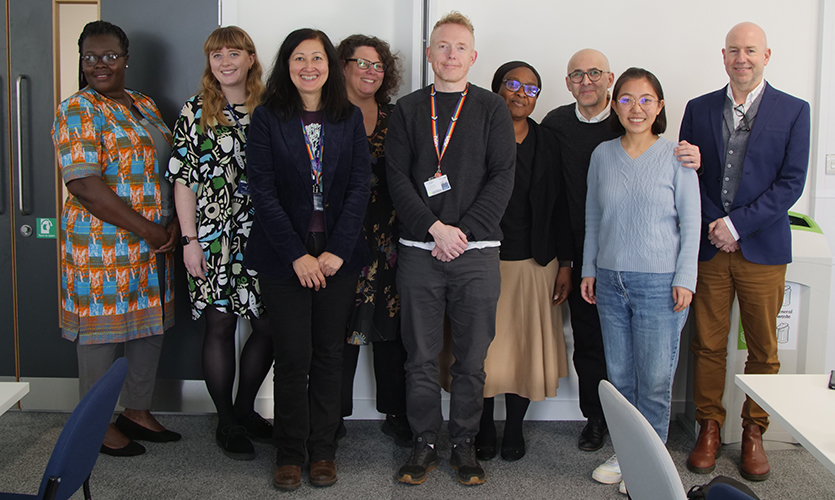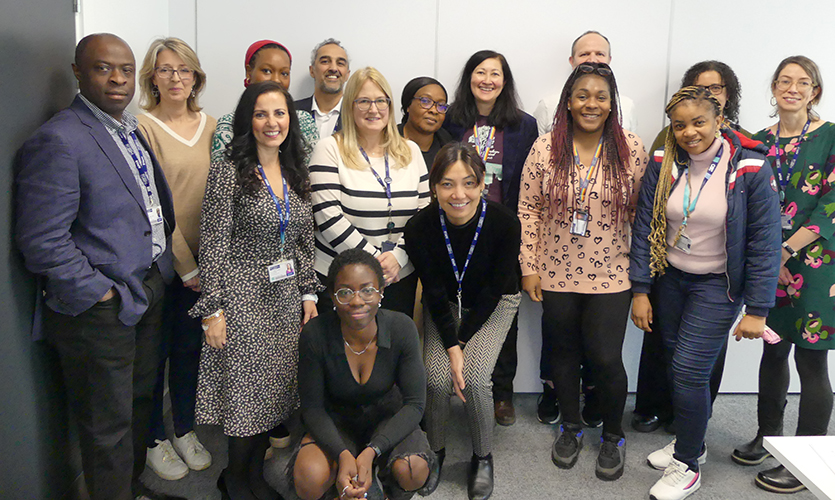Decolonising the curriculum events
Read about our recent events that aim to promote awareness and share good practice.
Decolonial Approaches in Teaching and Research Practice Mini-Conference

Picture: Moni Akinsanya and Nicola Koyama with LJMU staff and student speakers (Left to right: Cynthia Akwei, Victoria Brennan, Nicola Koyama, Gabriela Saengar Silva, Patrick Tkaczynski, Moni Akinsanya, Amir Asghari, Ning Yan, Martin Selby). Not pictured: Sarah McNamara, Javier Pereda and Ellie Glover.
Understanding decolonial approaches with attendees from over 30 institutions
Around 50 LJMU staff and students were joined by 80 academics from over 30 other institutions at the first mini-conference on Decolonial Approaches in Teaching and Research Practice at LJMU. The conference, organised by the LJMU Decolonising the Curriculum Working group, with support from the Doctoral Academy and Teaching and Learning Academy, aimed to create a space to reflect on practice, moving beyond diversifying representation towards defining and engaging with decolonial narratives.
Understanding what decolonising means
A dynamic discussion session was hosted by guest Dr Leon Moosavi who began by challenging academics to be specific about what we mean by decolonial approaches and identifying how practice links to theory. He said “While we still need more precision in articulating what [decolonising HE] means, we cannot ignore the claim that universities remain spaces in which the legacy of colonial inequality is present. If the decolonisation movement is to have a positive impact for staff and students then we must strive for meaningful changes at the same time as being critically self-reflexive about the challenges, and even limitations, of attempting to decolonise universities.”
Moving “from the abstract concept of decolonisation to what we can do in the classroom”
Speakers from four Faculties presented diverse perspectives, for example Victoria Brennan, Senior Lecturer in the School of Education, spoke about teaching and unteaching trainee teachers to increase awareness of Eurocentrism in the science curriculum. Nicola Koyama, Chair of the Decolonising the Curriculum Working Group said “This event has been a great opportunity to discuss the confusion around decolonial approaches. It’s exciting to be at the start of a long process to think about how we can move away from instructional methods, address power inequities and move towards co-creating with students”.
Jason McIntyre, Senior Lecturer in Psychology thanked speakers for the examples shared saying "It was great to have some concrete examples to take back and share with people at my school. This is really helpful to move from the abstract concept of decolonisation to what we can do in the classroom or lecture theatre"
“An inspiring meeting!” and a pledge for action
Individual approaches to decolonising research practices were presented by staff and postgraduate students on diverse topics from representation in cultural heritage and inequality in exhibitions, equity in collaborative relationships and the rationality of research questions within the field, and practical ways of integrating decolonial learning into qualitative methods. Kehinde Ross, Reader in the School of Pharmacy and Education expressed thanks for “a lovely and inspiring meeting!”.
The conference concluded with a JMSU Decolonising the curriculum pledge presented by Shaquita Corry (VP Education, JMSU) who said “The pledge will be taken to the LJMU Education & Student Experience Committee where I will invite members to sign it, before presenting it to members of our LJMU Executive Leadership Team to urge them to take action”.
Recordings of presentations from the Decolonial Approaches in Teaching and Research Practice are available.

The Decolonising the Curriculum Working Group (left to right: back row - Kehinde Ross, Susannah Waters, Pauline Musembi, Atif Waraich, Moni Akinsanya, Nicola Koyama, Jason McIntyre, Andrea Newman, Victoria Sheppard, middle row – Zal Kamil-Thomas, Liz Clifford, Judith Enriquez, Dominique Walker, [Student: Ifeoma Pete-Iwuoha], front row – Marie Hie).
Not pictured: Chijioke Chika Chijioke-Oforji, Olatunde Durowoju, Jane Eme-Power, Rosa Fong, Stacey Habergham-Mawson, Denise Lee, Adam Papworth, Javier Pereda, Ben Stanford, Helen Summers, Cath Walker.

